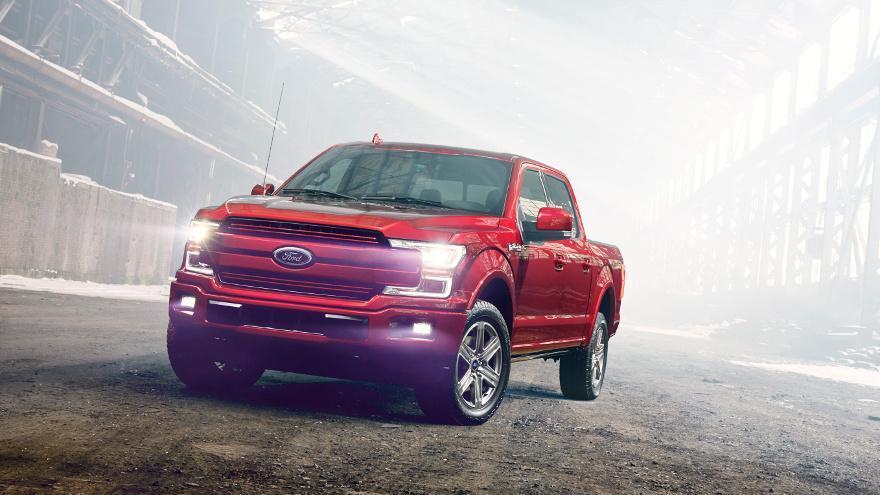Wholesale vehicle prices in Canada have now fallen for five straight weeks, but take that trend with a grain of salt.
According to Canadian Black Book’s latest weekly COVID-19 Market Update, the declines are lower than seasonally expected and pale in comparison to November 2019, thanks to basic supply and demand (more on that later).
Specifically, there was a 0.16% price dip, on average, for car segments last week, while truck prices were down an average of 0.21%.
Car prices have fallen an average of 0.14% per week over the last month, according to CBB, with truck prices dropping 0.11%.
Last November, car values were falling an average of 0.39% each week and trucks were softening 0.29%.
“The fundamental rules of supply and demand are to be blamed here,” CBB said in the report. “With shorter supply, prices are not undergoing the seasonal decline we would normally see at this time of year and therefore showing smaller levels of depreciation.”
So, let’s look at some supply dynamics.
As CBB explains, November typically begins the “quieter times” in wholesale that lasts through early March, and this year appears to be no different. Auction volumes have dropped roughly 20% over the past few weeks, CBB estimates, amid low supply overall.
To illustrate this point, CBB shares the example of off-lease supply, which perhaps isn’t having the market impact it was once expected to this year.
“As a reminder, the industry was expecting to see a record number of leases returning to the market. We are now three years after the best sales year on record; hence those 36-month leases are finished,” CBB explained.
“Given the tight supply in general, a large portion of lease returns are being purchased by retailers processing the lease returns and not moving to wholesale,” it added. “Of the lease return vehicles not purchased by the grounding dealers, many are processed through the private upstream channels of the leasing company.”
CBB anticipates short wholesale supply will continue throughout the month.
But the shortage — driven by lack of trade-ins, stemming from slower retail sales in earlier months — shouldn’t be long-lasting. In fact, CBB called for a “slow build-up” in wholesale sales during fall and winter months.
“CBB believes this shortage to be temporary, with more supply expected in the coming months, especially as repossessions will begin to happen in greater numbers as personal bankruptcy filings increase and lenders begin to focus more resources on collecting past due accounts,” it noted.
CBB also projects more than 400,000 lease terminations next year, which is on par with 2020.
“These units coming to market in 2021 will help provide much-needed supply relief,” CBB said.
Turning back to the pricing side, the company said in a separate analysis that the Canadian Black Book Used Vehicle Retention Index has broken records for two straight months. And that, again, ties back into supply.
It was at 110.5 in October after reaching 109 in September.
“The record high levels are primarily due to shortages in supply of used vehicles in the marketplace,” CBB said. “Many months of lower new car sales have reduced the volume of vehicles entering the market as trade-ins.
“High demand for used vehicle for export to the U.S. market has also siphoned off considerable volume of supply from Canada.”
The index record also touched on the impact of lease returns, which despite being at record highs, have been gobbled up by grounding dealers to take care of inventory needs amid low supply. But expect some opening in supply next year.
“It is expected that the level of supply in the market will grow in 2021 as repossessions slowly rise and consumer demand stumbles,” CBB said.
Here’s a phrase you don’t often hear during 2020’s topsy-turvy automotive market: “much more even-tempered.”
But alas, that’s how Canadian Black Book describes wholesale vehicle price trends at October’s end.
There was a 0.03% dip in prices this past week for both truck segments and car segments — a decline that is “quite small” when weighed against what usually occurs in late October, CBB said.
“As we near the end of the month of October, we continue to observe the wholesale vehicle market is much more even-tempered compared to the volatility the industry has endured for much of 2020,” the company said in its latest weekly COVID-19 Market Update.
CBB pointed to wholesale price stability over the past month, calling it “a great departure from the market volatility since the spring.”
Since early May, car values have had an average weekly change of (positive) 0.22%, with trucks at (positive) 0.32%, CBB noted in the report.
And compared to the past week’s 0.03% dip for cars and trucks, the same week of 2019 showed much larger declines. There was a 0.30% drop in car values and a 0.26% drop in truck values that week.
“Despite the upheaval year to date, we appear to be in a much quieter and stable phase of the market, at least for the time being,” CBB said.
In terms of auction volume, the first four weeks of the fall market have showed consistent, albeit lower-than-usual, numbers, the company said.
Fall auction volume numbers have been “much lower” compared to the summer, something CBB attributed in part to typical seasonal slowing.
“There are also smaller than expected numbers of lease returns coming to auction each week,” the company said in the report.
“Due to the general shortage of used vehicles in the market, many lease-end vehicles are claimed by the grounding dealers and not being brought to auction,” it added. “Of those destined to be sold, the ever-growing selection of closed auction options and other digital auction platforms are processing quite a bit of the available volume, which diverts yet more vehicles away from the open auction.”
As if dealers didn’t already have enough challenges amid the coronavirus pandemic, the newest information from Canadian Black Book showed wholesale and retail prices are heading in opposite directions that make the prospect of generating margins and profit even more difficult.
Canadian Black Book released its newest COVID-19 Market Update earlier this week with analysts noting that wholesale values climbed for both cars and trucks during the second week of September; albeit at much smaller rates compared to large increases they recorded during the value rebound unfolding during the past two months.
While the rises might have been smaller, CBB said car values now have climbed five consecutive weeks while truck values are in the midst of a streak of eighth consecutive weeks of upward movement.
Meanwhile, Canadian Black Book combined its latest data and observations to summarize the retail landscape, compiling figures that might frustrate dealer principals and general managers.
“We enter September with a negative trend in listing prices, similar to what has been observed since early June of this year,” analysts said in the report. “The trend in retail asking prices has been quite different compared to those in the wholesale market, where values have been strengthening.
“The conclusion from the data is that Canadian retailers’ used-vehicle margins are still under pressure and profit levels continue to be squeezed during the crisis,” they continued. “The 14-day moving average for retail asking prices has fallen by 3.2%, since the first week of June’s peak.
“In the same period, wholesale prices have increased by over 6%, thereby compressing margins by over 9%. The total decline in price is just over $900,” analysts went on to say.
More wholesale price details
For the week of Sept. 7, Canadian Black Book determined that nine car segments increased in wholesale price by an average of 0.05%. As mentioned, that’s smaller than other recent readings — 0.14% during the week prior and a record 0.35% spotted three weeks ago. Analysts computed the average during this stretch to be 0.16%.
“Wholesale price trend for cars remains positive, yet gains have weakened in recent weeks,” Canadian Black Book said.
Analysts noticed that values for near luxury car climbed most this past week, rising by 0.49%, followed by the luxury car segment at 0.12%.
Perhaps reflecting the change of seasons, CBB mentioned the car segment with the steepest decline this past week was sporty cars sliding by 0.43%. Subcompact car values also declined by 0.12%.
Counter to what their U.S. colleagues recently reported, Canadian Black Book indicated truck values continue to be strong, climbing by an average by 0.19% during the week of Sept. 7. That topped the previous week’s average of 0.10%.
Analysts pointed out that values for full-size crossover/SUVs led the way with a gain of 0.54%, followed closely by sub-compact luxury crossover/SUVs (up 0.52%), sub-compact crossover/SUVs (up 0.50%) and minivans (0.50%).
Wholesale volume, sales rate discussion
On the volume front, Canadian Black Book described a scene where the cliché quantity over quality might be appropriate.
“In September, our analyst team has noted that auction volumes remain strong. We have noted that the quality of vehicles in many cases has decreased. Specifically, this past week our team noted larger numbers of higher mileage vehicles, older model years and vehicles with corrosion issues,” analysts said.
Canadian Black Book noted that industry feedback continues to be that used vehicles are in tight supply.
The report noted that the number of days to turn for vehicles listed for sale by retailers dipped again during the second week of September. CBB pinpointed the national average at 46 days with the rolling average for the past 14 days at 53.
To put that number in perspective, analysts recapped that the national number was 75 days to turn back at the end of May. Canadian Black Book elaborated on how that data point has shifted during the past few months.
“The shortage in used product, which may seem surprising to many, is a result of what has gone on in the market this year,” analysts said. “When lockdown actions first halted much of the industry in Canada, this created greatly reduced numbers of trade-ins to feed auctions and for retailers to sell.
“Tens of thousands of lease returns, a very large source of used-vehicle supply, were extended, postponing the return to market of these vehicles. At the same time, the number of repossessions in the market also shrunk the number of vehicles available for sale at wholesale,” they continued.
“Our team expects drastically increased volume of repossessions over the duration of 2020,” CBB went on to say. “Much higher than expected levels of unemployment along with the looming closures of many businesses in Canada are expected to result in more repossessions.
“This increased supply, at a time when demand has an uncertain future, will drive prices downwards before a lasting recovery can take place.”
Also of note, analysts mentioned the sales success rates in Canadian auctions remained lower this past week versus what they have observed in recent months when rates were exceptionally high.
Last week, Canadian Black Book spotted a high sales rate of 86% in one auction lane and a low of 25% in another. On average, CBB pegged the average sales rate at approximately 60%; “much lower than rates we have been seeing,” according to analysts.
“We continue to note large numbers of prospective buyers online. However, prices are starting to become more static with fewer rapid increases,” they added.
According to the latest quarterly risk outlook report from RVI Analytics, Canadian used-vehicle prices were down slightly year-over-year in June, but picked up some momentum on a month-over-month basis.
Specifically, RVI’s Used Vehicle Price Index was at 1.010 for June, down 0.6% from a year ago but up 9.9% from May.
Taking out low-volume segments, some of the more notable increases month-over-month included minivans (up 21.4%), full-size pickups (up 14.6%) and small SUVs (up 10.6%).
Looking forward, the RVI Residual Value Index for full-year 2020 is expected to be 0.909, down 10% from its June reading of 1.010 and down 8.5% from 2019.
RVI is projecting a 0.8% year-over-year drop in 2021, before respective gains of 4.8%, 0.8% and 1.1% in the following years.
Over at Canadian Black Book, its latest weekly COVID-19 Market Update projects that for the rest of 2020, wholesale prices will be an average of 10% softer than pre-virus forecasts — an improvement over the initial outlook calling for a 17% slide from pre-virus projections.
Breaking that down, CBB is calling for a 13% softening in car segment values, with truck/CUV/SUV prices down 8%.
A recovery is expected to begin early next year, CBB said.
“The Canadian wholesale used-vehicle price trends from last week continued to be strong. The previous trend of sharp decreases has been replaced by stabilization on the car side and significant increases on the truck side of the lot,” CBB said in the report.
More specifically, car segment values climbed 0.11% last week after a 0.04% dip the prior week, CBB said, with trucks/SUVs/CUVs climbing 0.62%.
The latter marked the fourth straight week of growth for trucks/SUVs/CUVs and the strongest weekly gain of the last two years, CBB said.
“It remains the outlook of the CBB team that there will still be an additional drop in wholesale prices, compared to our pre-COVID-19 expectations this year,” its analysis said. “This further decrease in values will occur this fall/winter as the Canadian auto sector works to recover from the damage caused by COVID-19.”
A slight dip in the Canadian Black Book Index arriving in December did little to take away from the record-setting year for the wholesale price measurement.
Coming off the record of 108.5 being set in November, Canadian Black Book reported this week that the index edged just 0.1 point lower in December to land at what it called a “very respectable” reading of 108.4.
“It is safe to say that 2019 was the strongest year for retained values for 2- to 6-year-old vehicles since we began the index with 2005 data,” said Brian Murphy, vice president of research and analytics for Canadian Black Book.
Compared to December of 2018, CBB indicated the index across the industry is up 8.6%, which shows the magnitude of gains prices have seen over the last 12 months.
Analysts added, “2019 has been most certainly a bull market here in Canada.”
Surveying the numerous segments of the market shows a number of interesting observations, according to Canadian Black Book. For instance, analysts noted the compact CUV/SUV segment is down 4 points from last year.
“With more selection and supply this segment is one of the most competitive in the marketplace,” said analysts, who mentioned that this popular segment is also off 1.3 points from November.
CBB determined luxury cars did not have a strong December with the segment softening by 6 points versus December of 2018.
Analysts noted small pick-ups are also a noteworthy decliner in December with a loss of 7.2 points from a year earlier and 1.2 points from the previous month.
Canadian Black Book went on to state the market for full-size pickup trucks also experienced losses in December, dropping by 2.3 points from November. Analysts called it “a very significant decline for such an important segment here in Canada.”
On the positive side of the equation, CBB said compact cars and subcompacts cars are performing very well.
Compact cars are up 8.6 points from the same time a year earlier and half a point from November. Subcompact cars jumped “an impressive” 11.9 points year-over-year, the strongest move in CBB’s latest update.
“Both segments had some weakness in 2014-2016 but since have continued to strengthen,” analysts said.
The compact car, compact crossover and mid-size car segments were at new all-time highs for retained value in September 2019, as the Canadian Black Book Used Vehicle Retention Index has again hit a new all-time record high in the month of September.
“It is very rare for three segments to all experience new highs in a given month,” Canadian Black Book wrote in a news release about the September 2019 index. The company reported that sub-compact cars just missed setting a record high as well for retained value.
As for the overall new all-time record high for September, the new top score is 108.3, which is higher by a full index point from last month. CBB notes that its index is based on January 2005 as a starting point. At that time, the index started at 100.
“Given the record-high prices, we are seeing trade-ins are worth a lot more than before, and more leases are in a positive equity position at the end of the term,” CBB vice president, research & analytics Brian Murphy said.
Murphy continued, “Therefore we are seeing fewer of those vehicles at auction as more are bought out by the consumer and often traded in shortly thereafter for use as a down payment on a new vehicle.”
CBB said that for almost 15 years, Canadian Black Book has tracked how 20 market segments perform. The index hit a low of 74.8 in February of 2009. It has now risen by more than 33 points to the present level, since inception.
CBB provided an example showing that a used vehicle worth $10,000 in February 2009 would be worth almost $15,000 today. The company described that as “a substantial increase in retained value and one that makes a significant difference to how the Canadian industry functions.”
According to the report, the compact car, full-size van and sub-compact car segments have risen the most over the past year. Over the past 30 days from Oct. 18, the compact car, sporty car and sub-compact car segments gained the most.
Several segments showed a negative trend, however.
The entire industry on average is up 4.7 points since 2018, but compact luxury CUV/SUV is lower by 4.1 points. Luxury car and small pick-up have also acted contrary to market trends, showing declines. Over the past 30 days, full-size car, luxury car, and small pick-up also did not follow the trend for September, losing retained value.
“Heading into the last quarter of the year we will certainly be interested to see if the market continues its positive trend, or if we will finally see some negative trending in the marketplace after so many months of record high levels,” Murphy said.
This Index, which offers insights and statistics regarding the health of the used wholesale vehicle market across all regions in Canada, is calculated using Canadian Black Book’s published Wholesale Average value on two- to six-year-old used vehicles, as a percentage of original typically-equipped MSRP.
The used-vehicle price trend for the Canadian market in September? They are maintaining their increased price levels set earlier in the year, according to the autoTRADER.ca Price Index. September showed a 10.6% year-over-year increase, but compared to August showed a 1.6% month-over-month increase.
The autoTRADER.ca Price Index, which analyzes vehicle pricing data associated with more than 400,000 new- and used-vehicle listings, offers a monthly view of the Canadian automotive market.
One trend shown in the study is that used Asian-manufactured vehicles continue to retain year-over-year value. The average price of used Asian-manufactured vehicles has remained steady since February, currently at $16,588.
Overall, Canadian automotive price growth is stabilizing for new and used vehicles.
The September index showed a 1.1% median decrease for new vehicles in September compared to the previous month. Canadian automotive prices for new vehicles are still up by 1.6% year-over-year, but they have begun to show signs of leveling off.
As for used vehicles, since February, their median price has remained somewhat stable.
The 10.6% increase in year-over-year used-vehicle prices occurred mainly because of weak used-vehicle prices in market between August 2018 and October 2018, according to autoTRADER.ca. That situation, according to autoTRADER.ca’s analysis, is not reflective this year.
The average price of used sedans is up year-over-year. But it was virtually unchanged between July and September. That reflects a pattern autoTRADER.ca saw during the same period last year.
Meanwhile, used truck prices have remained flat for six of the past seven months. That is different than the 2018 situation, which showed median used truck prices fluctuating by plus or minus 6% over the course of the year.
Used SUV prices have seen consistency so far this year, with an approximate $22,000 average price. That compares to the average September 2018 price of approximately $21,000.
More on used Asian vehicles: They have shown the highest year-over-year increase in median price, at 10.6%, over last year’s prices, which were flat from July to October.
Additional trends: The study breaks down median price by body type. The national used car median price is $14,998, up 7.2% year over year. The median used SUV price of $21,999 is up 4.8% year over year, and the used truck median price of $29,995 is up 5.3% year over year.
The national top searched vehicles on autoTRADER.ca from late August 2018 to late September 2019 were:
1. Ford F-150
2. Ford Mustang
3. BMW 3-Series
4. Mercedes-Benz C-Class
5. Honda Civic
6. Porsche 911
7. BMW M
8. Jeep Wrangler
9. Mercedes-Benz E-Class
10. Chevrolet Corvette
It’s another value retention record.
Canadian Black Book’s CBB Used Vehicle Retention Index market average for August set a new record for two- to six-year-old vehicles at 107.2. That is a gain of 3.7 points from last year at the same time.
Also, continuing a positive trend showing a two-point gain across all industry segments so far in 2019, the index produced a 0.3-point gain from July.
CBB says the index offers unbiased and accurate insights and statistics regarding the health of the used wholesale vehicle market in Canada.
The report also showed some trends. One of them: Car values are strong. When it comes to retained value, the market strongly disagrees with rumors that cars are dead.
Compact cars gained 10 points over 2018 and 2.5 points from July, setting a new record of 116.3. As for mid-size cars, they also set a new record of 107.4. That is an increase of 5.5 points from last year and 1.4 points from July.
“These are impressive records in a market where the commonly held belief is that market demand fully switched over to SUV/crossover,” Canadian Black Book said in a news release.
Full-size cars were also up by 2.2 points in August.
Although most of the market sizzled, a few segments experienced a chilly August. No record lows occurred in values, but compact luxury CUV/SUVs dropped by 5.4 points from 2018 and 1.1 points from July. Although that segment was at an all-time high in July 2018, it has seen a decline since then. The smaller luxury CUV/SUVs, however, still outperform the industry average for retained value, according to CBB. The index has also seen minivans fall about 4.1 points compared to last year and 1.7 points from July.
After announcing in April that it would bring Kelley Blue Book to Canada, Cox Automotive Canada on Aug. 14 announced the arrival of MarketLens and Pricing Service Industry Solutions of Kelley Blue Book for its clients and dealers.
Kelley Blue Book notes that it has been a voice for vehicle valuations and automotive research in North America for more than 90 years, with its expertise in used-vehicle market value pricing providing dealers, OEMs, and lenders with exclusive offerings that it says provide “immediate business impact.”
The company says its Kelley Blue Book Fair Market Range and values for used vehicles are core to these new offerings. The company says both are based on real-time transactions and listings of what the market is paying for vehicles, and says they make adjustments to reflect changing market conditions.
The company says MarketLens and Pricing Service are notable features of the new offerings.
MarketLens, the company said, delivers used-car Kelley Blue Book Values in one environment. A user can identify the vehicle by VIN or by year/make/model to receive immediate access to what the company describes as industry-relevant values for business.
Kelley Blue Book says that for a customized experience, Pricing Service integrates Kelley Blue Book Values into a dealer or OEM website, mobile app, inventory management system, or loan origination platform.
Kelley Blue Book said that Kelley Blue Book Industry Solutions' Canadian offerings are fully bilingual and will include:
— Retail value
— Private party value
— Auction value
— Trade-in value
Cox Automotive Canada said that with the launch of Kelley Blue Book vehicle valuations, it continues to strengthen and add value to its current offerings. In addition to MarketLens and Pricing Service, Cox Automotive Canada said that Kelley Blue Book values will replace Manheim’s Market Report (MMR) and power Dealertrack’s TradeDriver product.
“We are continuing to transform the Cox Automotive ecosystem here in Canada, delivering an expansive full-suite of automotive solutions that put customer ease of use and operating efficiencies at the centre of every decision,” Cox Automotive Canada president Maria Soklis said in a news release. “Bringing Kelley Blue Book to our Canadian clients is a great example of this commitment.”
Compared to July 2018, Canadian median used-vehicle prices have risen by 6.8%.
Asian-manufactured used vehicles, at 10.3%, showed the largest year-over-year price increase.
And the Ford F-150 was the most commonly searched vehicle on autoTRADER.ca from late June to late July.
Those are just some of the findings from the July autoTRADER.ca Price Index.
The index, according to autoTRADER.ca, features a monthly view of the Canadian automotive market. The report analyzes vehicle pricing data associated with more than 400,000 new- and used-vehicle listings and shows the latest pricing shifts and trends.
One of those pricing shifts is that the median price across used sedans, SUVs and trucks all increased, by 4.9%, 6.7% and 3.5% respectively.
The index also breaks down price trends by region, with Ontario showing the largest year-over-year used-vehicle price increase, at 10.3%.
One of the report’s main findings in the new-vehicle area is a 5.8% increase in the median price of North American new vehicles. According to the report, the increased price and inventory of North American vehicles is the most likely reason for that, along with the region’s truck inventory growth.
The report also breaks out national median retail price by body type for new and used vehicles. For used cars, the median retail price is $14,998. That is a 4.9% year-over-year increase. The national median retail price for used SUVs is $22,395, which is a 6.7% year-over-year increase. And for used trucks, the national median retail price is $29,995, which is a 3.5% year-over-year increase.
National top-searched vehicles, and median price:
1. Ford F-150:
New: $53,684
Used: $29,000
2. Ford Mustang:
New: 40,444
Used: $25,759
3. BMW 3 Series:
New: $58,122
Used: $17,995
4. Mercedes-Benz C-Class:
New: $60,131
Used: $28,494
5. Honda Civic:
New: $30,567
Used: $10,480
6. Porsche 911
New: $164,935
Used: $94,800
7. BMW M
New: $120,409
Used: $55,000
8. Jeep Wrangler
New: $49,990
Used: $30,750
9. Mercedes-Benz E-Class
New: $85,532
Used: $28,995
10. Chevrolet Corvette:
New: $84,059
Used: $37,500












